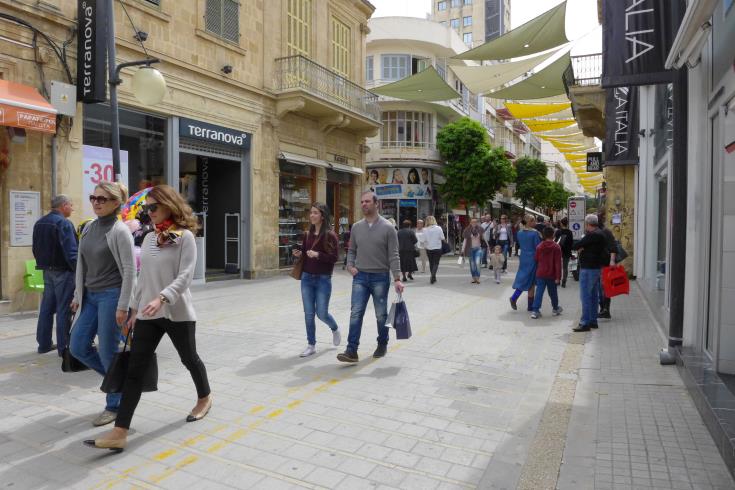Strong xenophobic attitudes are recorded in Cyprus, according to the results of the European Social Survey (ESS) for 2022, as reported by the Field Research Centre (FRC) of the University of Cyprus, noting also that the results highlight the role of the state in establishing a National Integration Plan for migrants.
According to the results, Cyprus ranks among the 10 most xenophobic countries that participated in the ESS (out of 31 in total).
FRC explains that today, while xenophobia may not have weakened, “we have the appropriate tools to recognize it and therefore manage it, and as such a reliable tool, we can also see the European Social Survey.”
According to FRC, the survey constitutes the most serious research infrastructure of the EU for collecting data concerning social issues.
It is conducted every two years in over 30 European countries and allows not only the assessment of the current situation at a specific point in time but also longitudinal comparisons to identify changes over time, both within the same country and comparisons of each country with all others.
Results for Cyprus
From the most recent data collection in Cyprus, when participants were asked whether migration of individuals of the same ethnic origin as that of the majority of the island’s inhabitants should be allowed, 58% agreed to some extent.
However, according to FRC, this response changed when the question referred to individuals of different ethnic backgrounds or coming from poorer non-European countries.
65% disagreed to some extent with migration of individuals of different ethnicities, a percentage that rises to 66% when it comes to individuals from poorer countries outside Europe.
“The above ‘contradiction’ between attitudes towards migration of individuals of the same and different ethnic origin indicates the presence of strong xenophobic attitudes in Cyprus: on the one hand, there is mild agreement towards migration of individuals of the same ethnicity as that of the majority of the island’s inhabitants. On the other hand, however, for individuals who would be considered ‘foreign’ (different nationality), the agreement turns into disagreement,” FRC states.
With this stance, Cyprus ranks among the 10 most xenophobic countries that participated in the ESS (out of 31 in total), and it is noted that Greek Cypriot residents, for the most part, seem to significantly differ from the general attitude in Europe, as more negative attitudes are observed in Cyprus compared to Europe on average.
Furthermore, attitudes towards migration seem to, to some extent, leave a geographical footprint, with Northern and Western countries generally evaluating migration more positively on average.
44% of participants stated to some extent that migration harms the economy, while 49% believed it also harms the cultural life of Cyprus.
Moreover, the majority of participants (48%) stated that with the arrival of people from other countries, Cyprus has become a worse place to live, according to FRC.
“The above responses reveal the prevalence of a sense of threat, specifically, realistic and symbolic threat,” it is stated.
FRC also reports that realistic threats (the word ‘realistic’ does not imply the existence of real threats and concerns only the subjective perception of the individual) have to do with fears related to physical dangers, for example, risks to the physical integrity or health of the individual, or in this case, to their economic prosperity.
Similarly, symbolic threats concern the sense of danger that may arise from the conflict between an individual’s or group’s worldview and another ‘foreign’ perception of things.
Such threats concern religion, values, morals, and traditions.
According to the announcement, there is a deterioration of attitudes towards migration between the years 2018-2020 in specific questions, which seems to be mainly due to the presence of strong symbolic threats.
“There may be a focused deterioration in the subcategory of asylum seekers from third countries, who were the main target of xenophobic mass media and official political xenophobic discourse of security from government officials during this period,” it is reported.
However, it is added that in Cyprus, there is a decrease in opposition to the general idea of migration over time.
Specifically, in Round 10 of the ESS, attitudes towards migration show signs of gradual improvement after 2012, where the most negative attitudes were recorded, perhaps due to the high realistic threats prevailing during a period of economic crisis and memorandum.
The non-dramatic worsening of attitudes towards migration in a period of data collection with intense migration flows to Cyprus and xenophobic discourse “from the official side of the government during this period,” generally seems to be mitigated by generational differences where younger generations appear to have significantly improved attitudes towards migration compared to the older generation, it is reported.
FRC considers that these findings do not cause alarm but constitute a creative basis for interventions aimed at raising public awareness and improving relations between the indigenous and immigrant populations.
The results of the ESS, according to FRC , highlight the role of the state in establishing a National Integration Plan for immigrants that needs to address the issue of migration comprehensively: from the integration of migrants and refugees into society (as opposed to their marginalization in reception centers), to the development of a comprehensive education program, the integration of migrants into the Cypriot labor market, and interaction with the native population.
Such a state plan, it is stated, requires “the necessary shift from representations of the Migrant as a threat, to a more humanitarian representation that sees the migrant population as an opportunity for the development of Cyprus, something that happens as we saw from the results of this research in many other European countries.”






